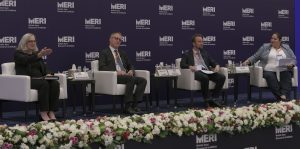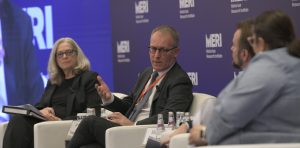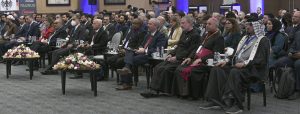Iraq’s Multi-Layered Crises: The International Partners’ Priorities and Perspectives
- Alina Romanowski, US Ambassador to Iraq
- Maurizio Greganti, Italian Ambassador to Iraq
- Ville Varjola, the Head of European Union
- Tanya Gilli-Khaylani, Former Member of Parliament, Iraq (Moderator)
This panel (at MERI Forum 2022) discussed the perspectives and priorities of Iraq’s international partners in the country (click here for video of the session in full). Tanya Gilli-Khaylani, the session moderator, noted that Iraq’s road to democracy has been riddled with many challenges, such as wars, internal and external tensions, economic issues, corruption, climate change and an overall lack of social cohesion. “Despite all of this, you are still here, and you continue to support Iraq”, she addressed the panel of Ambassadors. She asked them each to describe their country’s strategies and goals in Iraq, particularly in engaging the newly inaugurated government of Mohammed Shia Al-Sudani.
Ambassador Alina Romanowski of the United States, projected a positive view of the Iraq-US relations and said that she is looking forward to a collaborative engagement with the new government of Al-Sudani, and to further the bilaterally agreed Strategic Framework Agreement of 2008. She also emphasised that Iraq and the Iraqi Kurdistan Region (IKR) are strategic partners of the US and “the US is not going away from this region”. She referred to President Biden’s previous statement when he made it very clear several times that the US is here in the region, have partners in the region and are going to stay in the region. “So, if there is any doubt in anybody’s mind, I just want to reiterate that and calm everyone because I know there’s a lot of discussion about that”, said the Ambassador.
According to Romanowski, the US has a long-term commitment to the Middle East and will continue to cooperate with Iraq in areas of overlapping interests and shared priorities, including education, culture, economic reforms, promoting a vibrant private sector, fighting corruption and creating jobs. The US is particularly interested in supporting Iraq in tackling climate change through its interlocutors, businesses, and policies, and wants to safeguard strong governmental security institutions to ensure the enduring defeat of ISIS.
Ambassador Romanowski highlighted the importance of translating these agenda into action by the government, for their actions will “determine the breadth and depth of the US-Iraqi relationship.” She believes that the new government in Baghdad presents a new opportunity for progress in Iraq, and that the IKR can play a critical role in supporting the Sudani government. She stressed that: For Iraq as a whole to succeed, Baghdad and Erbil need to work together, find shared solutions to longstanding disputes, and within the Iraqi Kurdistan it will be important for our Kurdish friends to get their house in order. Unity at home here will only strengthen their voice in Baghdad and will also prevent outsiders from coming in, and using disputes and disagreements as another way to destabilize this important region and this important country”.

Referring to a memorandum of understanding signed between the US Department of Defence and the Kurdish Ministry of Peshmerga in September of 2022, Romanowski said “we are committed to a modern and efficient and effective force as part of the Iraqi security forces.” She urged the new Iraqi government to ensure the Iraqi security forces to be put under “the one commander-in-chief.” She finds the security reforms, which the US supports, to be critical in maintaining a united front against the remnants of ISIS in Iraq.
And on Iran’s missile attacks, she expressed her concerns and emphasised that the US has “very strongly condemned the Iranian attacks on Iraq’s sovereignty, IKR’s sovereignty and around, and that we are very concerned about the threat picture here and that we work very closely though our diplomatic and military and obviously other channels with our partners here to be extremely vigilant about this situation”.
Romanowski reiterated that the US seeks to advance democracy and human rights in Iraq and to support freedom of speech, anti-corruption measures, economic reform, educational exchanges, and cultural heritage preservation. To do so, and to advance US and Kurdish interests, the Kurds need to be united and be able to work together to find solutions to common challenges: “you are much stronger in representing your interests as a united voice than a hugely fractious voice.”
In response to questions from the audience about freedom of expression in the KRG, Romanowski reaffirmed her country’s commitment to freedom of expression: “we see this as a foundation for democracy. We have spoken out publicly and called out governments and institutions that arrest journalists, imprison journalists, reduce access to internet in the region and to intimidate journalists”.
Alongside the continued humanitarian assistance, the US, also has numerous developmental projects and initiatives in Iraq. Many USAID projects focus on stabilization, women empowerment and entrepreneurship, and agriculture. USAID has supported the creation of workspaces, such as ‘The Station’ in Erbil, which are helpful in providing much needed resources to young entrepreneurs and encouraging creativity and innovation.

Ambassador Maurizio Greganti of Italy spoke to Italy’s commitments to Iraq, stating that his country has always supported Iraq and will continue to do so. According to Amb. Greganti, Italy is very interested in seeing Iraq succeed, since the Middle East is important for Italy and “the stability of this country is the stability of your region [the Middle East].” Despite there being a new government in Italy, there will be no change in Italy’s policy towards Iraq and the Middle East, since Italy’s support towards Iraq is “a long-standing fundamental priority” of Italy’s foreign policy. Ambassador Greganti believes that consolidation of democratic institutions is the best guarantee for stability and long-term prosperity.
“On the security front, we now have this responsibility to lead the NATO mission in Iraq, which we take very seriously,” said Greganti. The role of NATO and the Global Coalition Against Daesh is highlighted in developing Iraqi and IKR security forces and strengthening Iraqi sovereignty. Ambassador Greganti is confident that the NATO’s presence in Iraq can help maintain Iraqi sovereignty against attacks from neighbouring countries, namely those that are members of NATO. He added that Italy’s support of Iraq exceeds military aid, and includes economic cultural and other developmental support projects. While Italy’s humanitarian programs are still ongoing, long-term developmental cooperation is given increasing priority. In this regard, Italy has a number of archaeological missions in Iraq. Iraq is unique in its historical depth, which Ambassador Greganti believes is essential to Iraqi identity.
Ambassador Ville Varjola, the Head of European Union (EU)’s Mission in Iraq, said that “on a very fundamental level, there is an alignment of interests between the EU and those of Iraq and Iraqis.” He referred to the democratic nature of the EU, and that the EU member states value democracy on a fundamental level, which translates directly into their foreign policy objectives. He stressed that the EU seeks to support Iraq’s sovereignty and has a clear stake in Iraq’s stability and social progress, since many issues in the country can have a direct impact on Europe, such as international terrorism, uncontrolled migration, and disruptions in energy supplies, to name a few. He outlined the EU’s objectives in Iraq, stating that the they are here “to support democratic governance take root in this country, and wish to see a more prosperous Iraq with more investment and trade with [the EU].”

Ambassador Varjola refered to the COVAX initiative that the EU supported, which provided Iraq with over six million Covid vaccine shots, in addition to the 1.5 billion Euros that have been mobilized by EU institutions since 2003 to help Iraq. On increasing developmental support, he said: “we [the EU] are also shifting the focus of our efforts to technical assistance, which will then enable Iraq to better use its own resources.” This is happening alongside continued humanitarian assistance for IDPs and refugees in the IKR and stabilization efforts in liberated areas of Iraq, to which Germany is credited for being the lead nation in these stabilization efforts. The EU also has many programs that provide vocational training, as well as programs that allow for legal migration to Europe. Finally, Varjola commended Iraq for taking the initiative to build bridges in the region, and hoped for further strengthening the EU’s relationship with Iraq’s new government.
Moderator Tanya Gilli-Khaylani reminded that the severity of the humanitarian crisis Iraq is facing, since all IDP and refugee camps in the country have now been closed except for those in the IKR: “saying that things have gotten better and ISIS is gone” is inaccurate and isn’t the answer.
Ambassador Varjola assures the audience that IDPs and the issues they face are still addressed in the EU programs and that the EU is planning on investing further in social protection. He also adds that all EU programs, irrespective of the topic, are gender sensitive and actively promote gender equality. To that, Ambassador Romanowski also spoke of her country’s intentions to continue their work for IDPs and Yezidi’s in particular with the new government.

